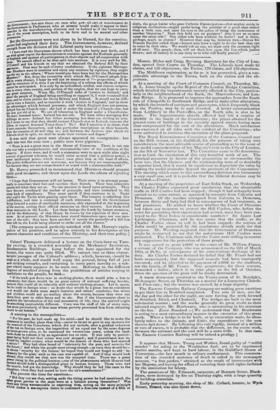Colonel Thompson delivered a lecture on the Corn-laws on Tues-
day evening, to a crowded assembly at the Mechanics' Institution, Southampton Buildings. Long before the hour appointed for the lecture, the room was quite filled. We extract two or three charac- teristic passages of the Colonel's address ; which, however, should be read as a whole, and would well repay the perusal, being full of just and striking remarks, and containing in some parts novelty on a sub. jeet which many suppose to be worn out. Referring to the different degrees of mischief arising from the prohibition of articles varying in usefulness to the people, he said- " If the trade put down NM in sticking-plaster, there would arise a loss to commerce, but there would be no great outcry of national suffering besides, because they could all do tolerably well without sticking.plaater. Let it, again, be the trade in foreign wine : no doubt that would be a great loss to commerce —it would cut down some men's luxuries and others' comforts ; but wives and children would not go wailing about the streets, because they were cut down from port to elder.dierry and to ale. But if the Government chose to prohibit the introduction of the real necessaries of life, then the miehief might be something incalculably different. Corn was the staff of life of every noon, but more particularly of that man whose poverty prevented him from obtaining much to eat besides."
A warning to the monopolists- " Fur his part, he had made up his mind—and he should like to make the statement in another place than this—never to be art or part in any measure for the removal of the Corn-laws, which did not include, after a gradual reduction of the tax on foreign corn, the imposition of an equal tax by the same degrees on home.grown corn, to be continued for twenty-one year', unless the lands lords chose to redeem it by an equivalent tax on rent. It was only by punish- ment being held out that crime was ever stopped ; and if punishment was in- flicted for smaller crimes, what would be the deserts of those who had starved a nation ? They had often heard of 'indemnity for the past, and security for the future ;' and when the people were strong enough—as soon they would be- ta obtain ' security for the future,' he hoped they would not forget to add in. &malty for the past,' such as the case was capable of. And if they would look abroad, they would see that now was the accepted time. There was a great Power rising in the political horizon—one of the pheenoinena which Heaven had decreed should hold a distinguished place in human history. Those who had the muscle, had got the knowledge. Why should they be led like oxen to the slaughter, when they had ceased to have the ox's senselessness?" The present the time for exertion— "Did they not see that, setting aside the rising power he had mentioned, the ether great parties in the state were at a balance among themselves? Was tire any thing aareasonable in expecting that, acting on the same principle Rhith makes a sea-captain desire to command a first-rate instead of a fifth or sixth, the great leader who gave Catholic Emancipation—that mighty stride in religious civilization—might prefer being the minister of a great state rather than a little one, and open his eyes to the policy of being the instrument of another liberation ? Does this hold out no prospect? does it act as no spur upon the other side? Has either side been without its faults? and is there, perhaps, much to choose? However that may be, between two—thieves Sir Francis Burdett called them—honest men have a right to do the best they can to come by their own. We would rob no one, we want only the common right of all men. The people, then, will set their foot upon the line which justice draws; and all history is in one story as to wbo will finally prevail."


























 Previous page
Previous page